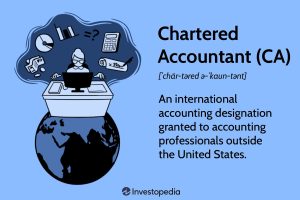The Role of a Chartered Accountant: Financial Experts at Your Service
When it comes to managing the complex web of financial regulations, taxation, and financial reporting, chartered accountants play a crucial role. These professionals are highly trained experts in the field of accounting, bringing their skills to a wide range of industries and businesses. Let’s dive into the details of what a chartered accountant does and why their expertise is indispensable.
Understanding the Chartered Accountant Designation
A chartered accountant is a professional who has earned a prestigious accounting qualification from a recognized accounting body. In many countries, this title is granted by passing a series of rigorous exams and fulfilling specific work experience requirements. Chartered accountants are not only well-versed in accounting principles, but they also have a deep understanding of finance, taxation, auditing, and business management.

Financial Reporting and Analysis
One of the core responsibilities of a chartered accountant is to prepare and analyze financial statements. These statements provide a snapshot of a company’s financial health, including its assets, liabilities, revenues, and expenses. Chartered accountants ensure that these statements are accurate, compliant with accounting standards, and provide meaningful insights to stakeholders, investors, and management.
Taxation Expertise
Chartered accountants are often sought after for their expertise in taxation. They help businesses navigate the complex landscape of tax regulations, ensuring compliance while also optimizing tax strategies to minimize liabilities. Whether it’s corporate tax, income tax, or value-added tax, these professionals provide valuable guidance that can lead to substantial savings for businesses.
Auditing and Assurance Services
Auditing is a critical function that provides assurance about the accuracy and reliability of financial information. Chartered accountants conduct audits of financial records to ensure they are free from material misstatements. These audits are not only important for maintaining transparency but also for building trust among stakeholders, such as investors, lenders, and regulatory authorities.
Advisory and Consultation
Chartered accountants serve as trusted advisors, offering expert insights into financial matters that impact business decisions. They help companies formulate effective financial strategies, assess the feasibility of projects, and provide guidance on expansion plans. Their analytical skills and in-depth knowledge of financial markets enable them to offer valuable recommendations for achieving long-term business goals.

Regulatory Compliance
Staying compliant with financial regulations is a complex task, and failure to do so can lead to serious consequences. Chartered accountants ensure that businesses adhere to relevant accounting standards, industry regulations, and legal requirements. They help in the preparation of financial reports that meet the guidelines set by regulatory bodies, ensuring transparency and accountability. https://celestinos.com.au/celestino-tax-advisory/
Continuous Professional Development
The field of accounting is ever-evolving, with new regulations, technologies, and practices emerging regularly. Chartered accountants are committed to continuous professional development to stay updated with the latest industry trends. They participate in training programs, workshops, and seminars to enhance their skills and knowledge, ensuring that they provide the best possible service to their clients.
Final Thoughts
In essence, the role of a chartered accountant extends far beyond number crunching. These professionals are financial experts who provide essential services that contribute to the success and growth of businesses. Their expertise in financial reporting, taxation, auditing, and advisory make them indispensable partners for companies of all sizes, ensuring sound financial management and compliance in an ever-changing economic landscape.


